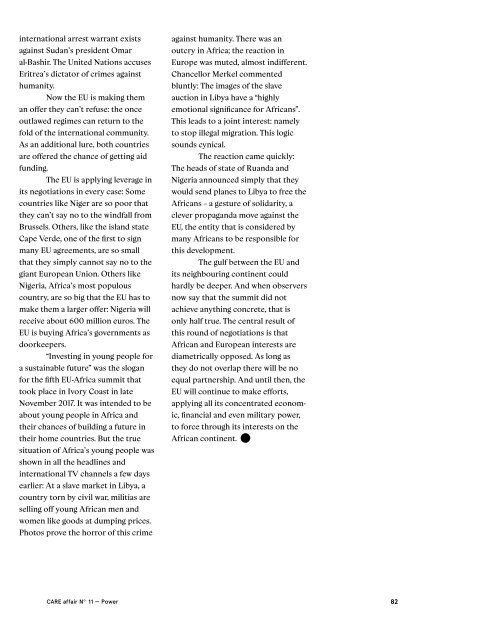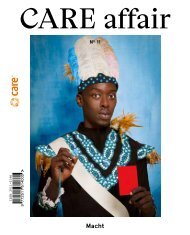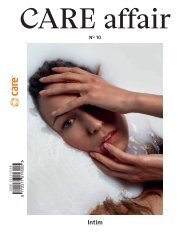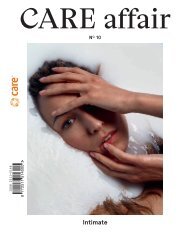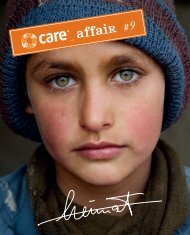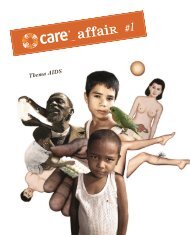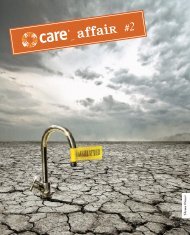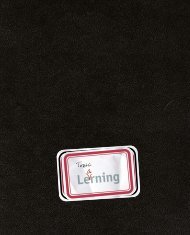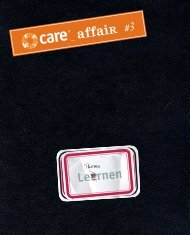CARE Affair #11 - Power
You also want an ePaper? Increase the reach of your titles
YUMPU automatically turns print PDFs into web optimized ePapers that Google loves.
international arrest warrant exists<br />
against Sudan’s president Omar<br />
al-Bashir. The United Nations accuses<br />
Eritrea’s dictator of crimes against<br />
humanity.<br />
Now the EU is making them<br />
an offer they can’t refuse: the once<br />
outlawed regimes can return to the<br />
fold of the international community.<br />
As an additional lure, both countries<br />
are offered the chance of getting aid<br />
funding.<br />
The EU is applying leverage in<br />
its negotiations in every case: Some<br />
countries like Niger are so poor that<br />
they can’t say no to the windfall from<br />
Brussels. Others, like the island state<br />
Cape Verde, one of the first to sign<br />
many EU agreements, are so small<br />
that they simply cannot say no to the<br />
giant European Union. Others like<br />
Nigeria, Africa’s most populous<br />
country, are so big that the EU has to<br />
make them a larger offer: Nigeria will<br />
receive about 600 million euros. The<br />
EU is buying Africa’s governments as<br />
doorkeepers.<br />
“Investing in young people for<br />
a sustainable future” was the slogan<br />
for the fifth EU-Africa summit that<br />
took place in Ivory Coast in late<br />
November 2017. It was intended to be<br />
about young people in Africa and<br />
their chances of building a future in<br />
their home countries. But the true<br />
situation of Africa’s young people was<br />
shown in all the headlines and<br />
international TV channels a few days<br />
earlier: At a slave market in Libya, a<br />
country torn by civil war, militias are<br />
selling off young African men and<br />
women like goods at dumping prices.<br />
Photos prove the horror of this crime<br />
against humanity. There was an<br />
outcry in Africa; the reaction in<br />
Europe was muted, almost indifferent.<br />
Chancellor Merkel commented<br />
bluntly: The images of the slave<br />
auction in Libya have a “highly<br />
emotional significance for Africans”.<br />
This leads to a joint interest: namely<br />
to stop illegal migration. This logic<br />
sounds cynical.<br />
The reaction came quickly:<br />
The heads of state of Ruanda and<br />
Nigeria announced simply that they<br />
would send planes to Libya to free the<br />
Africans – a gesture of solidarity, a<br />
clever propaganda move against the<br />
EU, the entity that is considered by<br />
many Africans to be responsible for<br />
this development.<br />
The gulf between the EU and<br />
its neighbouring continent could<br />
hardly be deeper. And when observers<br />
now say that the summit did not<br />
achieve anything concrete, that is<br />
only half true. The central result of<br />
this round of negotiations is that<br />
African and European interests are<br />
diametrically opposed. As long as<br />
they do not overlap there will be no<br />
equal partnership. And until then, the<br />
EU will continue to make efforts,<br />
applying all its concentrated economic,<br />
financial and even military power,<br />
to force through its interests on the<br />
African continent.<br />
<strong>CARE</strong> affair N o. 11 — <strong>Power</strong><br />
82


